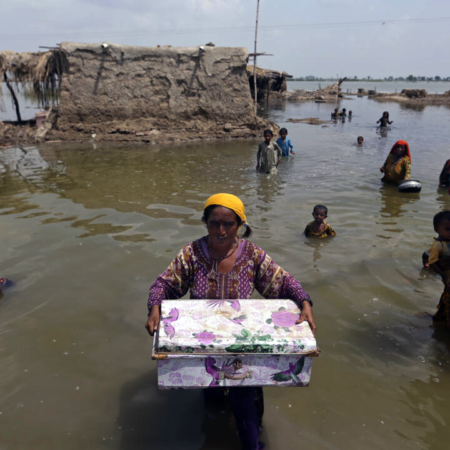According to the national fire agency, an airplane belly-landed and went off the runway at South Korea’s Muan International Airport on Sunday, slamming into a wall and igniting a blaze, killing at least 127 people.
Shortly after 9 a.m. (5 a.m. PST), South Korea’s transport ministry reported that Jeju Air aircraft 7C2216, carrying 181 passengers, was trying to land at the southern airport after arriving from Bangkok, the capital of Thailand.
According to ministry data, it is on track to become the deadliest air accident in South Korea’s history and the worst to involve a South Korean airline in almost thirty years.
Video from local media shows the twin-engine Boeing 737-800 going down the runway without any visible landing gear before crashing into a wall in a detonation of flames and debris. Parts of the aircraft were engulfed in smoke and flames in other pictures.

The head of the local public health center stated that authorities have shifted from rescue to recovery operations and are searching nearby areas for bodies possibly thrown from the plane due to the force of the impact.
Two crew members, a man and a woman, were rescued from the tail section of the burning plane, according to Muan fire chief Lee Jung-hyun, who also told a briefing that the fire had been put out as of 1pm. “Only the tail part retains a little bit of shape, and the rest of the plane looks almost impossible to recognize,” Lee said during the briefing.
The incident occurs just days after an Azerbaijan Airlines aircraft attempted to land at its destination in the Russian city of Grozny before veering off course across the Caspian Sea and crashing in the Kazakh city of Aktau on Wednesday, killing 38 of the 67 people on board.
“My final remarks”
Family members gathered in the arrival area of the airport hours after the incident, some sobbing and embracing while Red Cross volunteers distributed blankets.
Families were given papers to fill out with their contact information.
To get additional information from authorities, one relative stood at a microphone. “I don’t know what’s going on,” he stated, referring to the death of his older brother. “I’m not sure.”
Authorities claimed a temporary morgue had been set up, and funeral cars lined up outside to remove the dead.
Witnesses told Reuters that the accident site smelled of blood and aviation fuel, and workers wearing masks and protective suits combed the area while soldiers rummaged through bushes.
Shortly after the disaster, an airport official told Reuters that rescue efforts had been underway to save lives in the tail section.
According to data from the transportation ministry, the catastrophe is the deadliest to happen to a South Korean airline since the 1997 Korean Air disaster in Guam, which claimed over 200 lives. The worst on South Korean territory was a 129-person Air China crash.
According to Lee, investigators are investigating weather and bird strikes as potential contributing reasons. According to airport officials quoted by Yonhap, the landing gear problem might have been triggered by a bird hit.
Without mentioning whether the flight claimed to have struck any birds, a transport ministry official stated that the pilots quickly called Mayday after the control tower gave a bird strike alert.
According to the official, the aircraft made its disastrous attempt to land approximately one minute after the Monday call.
According to the News1 agency, a traveler texted a family member to inform them that a bird had become lodged in the wing. “Should I say my last words?” was the person’s last message.
According to the transportation ministry, the remaining passengers are thought to be South Koreans, while two Thai nationals were among them.
Bereaved people are Jeju Air’s main priority.
In a televised briefing, Jeju Air CEO Kim E-bae expressed regret for the mishap and bowed sincerely.
He stated that the cause of the crash was still unknown, that there were no early indications of malfunction, and that the aircraft had no accident history. According to Kim, the airline will work with investigators and prioritize helping the grieving.
No abnormal conditions were reported when the aircraft left Bangkok’s Suvarnabhumi Airport, said Kerati Kijmanawat, president of Airports of Thailand. It is the first fatal flight for Jeju Air, a low-cost airline founded in 2005 that ranks behind only Korean Air Lines and Asiana Airlines in terms of the number of passengers in South Korea.

The accident happened only three weeks after it started regular flights from Muan to Bangkok and other Asian cities on December 8. Muan International is one of South Korea’s smallest airports, but it has seen the number of international passengers jump nearly 20 times to 310,702 from January to November this year from the same period in 2022, according to government data.
“We are in contact with Jeju Air regarding flight 2216 and stand ready to support them,” Boeing stated in an email statement. Our thoughts and prayers are with the passengers and crew, and we offer our sincere condolences to the families who lost loved ones.
A request for comment from the US Federal Aviation Administration was not immediately answered.
According to Yonhap, all flights, both local and international, have been canceled at Muan airport.
Arriving at the scene of the disaster, South Korean acting President Choi Sang-mok, who was appointed interim leader of the nation on Friday in the midst of an ongoing political crisis, stated that the government was using every resource possible to address the crash.
Two Thai women were on the plane, aged 22 and 45, Thai government spokesperson Jirayu Houngsub said, adding that details were still being verified. Thai Prime Minister Paetongtarn Shinawatra sent condolences to the families of the dead and injured in a post on X, saying she had instructed the foreign ministry to provide assistance.
The ministry said in a statement it was in touch with the South Korean authorities. President Asif Ali Zardari expressed regret over the plane crash and extended his condolences to the families of the bereaved, according to a post on X by PPP.
In a post on X, Prime Minister Shehbaz Sharif expressed his “deep sadness” over the accident.
“The families of the deceased, as well as the people and government of the Republic of Korea, are in our thoughts and prayers during this time of sorrow.”












No Comment! Be the first one.